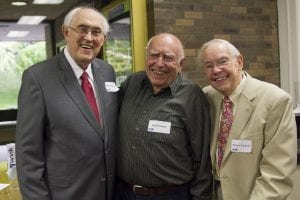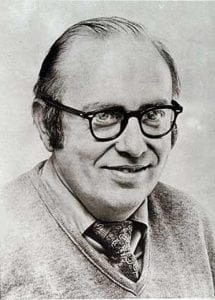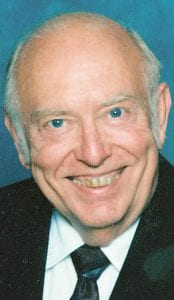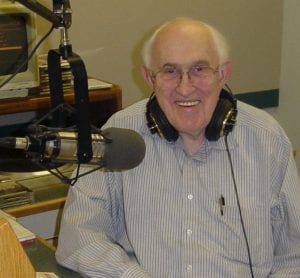A Tribute To A Rock Island Treasure: Roald Tweet
Roald Tweet had a way with words, with listeners, with his comforting voice, and his patient, relentless curiosity and compassion will be felt in the Quad-Cities for years to come.

Tweet was best known for his 3-minute segments “Rock Island Lines” on WVIK.
The 87-year-old Augustana College professor emeritus of English died on Wednesday after a brief illness (congestive heart failure and Covid-19), and the tremendous loss reverberates throughout the community.
“He was my teacher from the time I was seventeen till now,” said Ann Boaden (Augie Class of ’67), a longtime English professor who retired in 2016. “His brilliance, his puckish wit and playfulness, his persistence in asking questions, encouraged students to do the same: to look carefully at their world, as he did, and to find in the beauty, mystery, and delightful absurdity that he did.”
“He loved to quote poet e.e. cummings’s line about Buffalo Bill: ‘What do you think of your blue-eyed boy Mister Death?’” she recalled Thursday. “Roald Tweet’s is a spirit equally incomprehensible, equally unconquerable, by death.”
He became a member of the Augustana English Department in 1960, and remained there until his retirement in 1999; he chaired the department from 1967 until 1984. In 1998, he was appointed to the Conrad Bergendoff Chair in the Humanities, the second person (after Dorothy Parkander) to hold the College’s first endowed position.
“Dr. Tweet is beloved by a generation of graduates for his passion for ideas and his love of the liberal arts,” Augustana president Steve Bahls

Tweet (center) with Don Wooten (left) and Bill Wundram in 2013.
said Wednesday night. “He is one of the most revered faculty members in Augustana’s history.”
Tweet grew up in Brownsville, Minnesota, and lived most of his life along the Mississippi River, “a richly alluvial thread that meanders through much of his creative work,” said Kai Swanson, special assistant to the Augustana president, said. “Several of his writing projects were undertaken on behalf of the U.S. Army Corps of Engineers.”
“The outstanding teachers at Rock Island High School taught me how to write. Roald Tweet taught me how to have a little fun doing it,” Swanson (a 1986 Augustana alum) posted on Facebook.
Tweet was a regular speaker for the annual Frieze Lecture Series, presented by Augustana and the Rock Island Public Library.
“Roald was a frequent speaker and audience member. We could always depend on a full audience when Roald was in the house,” Lisa Lockheart of the library said Thursday. “He had a way of spinning out a story that kept everyone in the palm of his hand.”
You can view his 2016 lecture, “1841, the Year That Rock Island Began.”
Beginning in 1995, Tweet produced a regular radio segment called “Rock Island Lines” on WVIK 90.3 FM, Augustana’s National Public Radio station, and he also co-hosted the weekend writing-themed show, “Scribble,” with Don Wooten, since late 2014. In 2006, Tweet was presented the Studs Terkel Humanities Service award from the Illinois Humanities Council.
He was nominated by former Rock Island Mayor Mark Schwiebert.
“Few people could be more deserving of an award named after Studs Terkel than Roald Tweet,” Schwiebert said in a 2006 news release. “Like Mr. Terkel, Roald is a consummate observer and listener of the rhythm and pattern that make life on the Upper Mississippi, and of the habits

Tweet taught English at Augustana College for 39 years.
and attitudes that shape the lives of the people who live here.
“As a gifted retired professor, he teaches less by lecturing than by casting a curious eye on the world around him and then by inspiring the curiosity of his listeners,” the former mayor said. “I’m delighted to have had a hand in gaining this well-deserved recognition for Dr. Tweet.”
In 2001, Tweet received the Illinois Humanities Council’s Lawrence W. Towner Award for his “Rock Island Lines” radio commentaries on WVIK. He also was a contributor to “On the River,” published by the Quad-City Times.
His published works include “A History of the Rock Island Corps of Engineers, 1866-1893” and “The Quad-Cities: An American Mosaic.” A craftsman as well as a scholar, he made a model of the first railroad bridge crossing the Mississippi River on the occasion of the 150th anniversary of the bridge, which linked Rock Island and Davenport.
“Being a Norwegian-American, I am overwhelmed,” he said of the Terkel award. “We really don’t have that much spice in our lives, salt and pepper plus cardamon at Christmas.”
A Wisconsin native
Tweet was born on Sept. 1, 1933, in Fountain City, Wis., and grew up in southern Minnesota. He graduated from St. Olaf College in 1955 and received his doctorate in American literature from the University of Chicago in 1967.
In addition to his work in Augustana’s English department, Tweet served on the faculty for the private Rock Island school’s graduate program in regional studies. He also served as the faculty advisor for the Observer and the Writer’s Club. In 1990, Tweet received the Sears-

Tweet died Nov. 4 from Covid-related complications in a Peoria hospital.
Roebuck foundation Teaching Excellence and Campus Leadership Award.
Tweet, who lived most of his life along the Mississippi River, wrote numerous publications on various aspects of the Mississippi River and Quad-Cities history. Several of his publications have been for the Army Corps of Engineers. Tweet was also a staff member of Mississippi Valley Writers Conference.
In 1957, he married Margaret Knudson, whom he met in college; they had three children. His hobbies included whittling, wood-carving, and building model airplanes, grandfather clocks, and a clavichord for fellow Augustana professor Dorothy Parkander.
Since retirement, Roald and his wife maintained their family home of 60 years, a Queen Anne-style house just off campus built in 1889 and long associated with Professor Ernest W. Olson, who translated the beloved Swedish hymn “Tryggare kan ingen vara” into “Children of the Heavenly Father,” Swanson said.
The Tweets have eight grandchildren and seven great-grandchildren, many of whom reside in the Quad-Cities. In a 2017 newspaper feature, Roald Tweet said he stayed busy reading, building model airplanes and carving wood at home. Margaret tended to their backyard garden, which abuts Lincoln Park, and said one of her husband’s favorite recipes was creamed beef on toast.
The popular storyteller began attracting devout listeners when he launched the “Rock Island Lines” series, which are available as a podcast. As of 2017, Tweet recorded more than 1,150 episodes and wrote and produced 10 to 15 recorded segments a year.
The 2½- to 3-minute pieces (always beginning “This is Roald Tweet on Rock Island”) tell tales of the region’s “traditions, institutions and people,” according to WVIK, which continues to air the narratives at 11 a.m. weekdays. on 90.3 FM.

Jay Pearce is general manager of WVIK.
The station described the segments this way: “Roald has spent much of his life travelling up and down the river, with forays overland, east and west, talking to the people, reading their journals, and enjoying the humor and history of America’s heartland. His observations about life around Rock Island strike responsive chords across the region. It’s a viewpoint that will enrich and enliven your day.”
Alongside his pal, Don Wooten, Tweet also co-hosted “Scribble,” which airs at noon every Saturday on the Quad-Cities NPR station. The musing duo focuses mostly on writing and poetry and those passionate about the craft.
“If you scratch hard enough, everybody has a story,” Tweet said in 2017. The veteran duo had recorded four interviews for “Scribble” that have yet to air on WVIK, and they will be:
- 7 — Mike Mickle
- 14 — Bob Applegate
- 21 — Gayle Rein
- 28 — Anthony Fuhs
WVIK general manager Jay Pearce said that until Covid this spring, Tweet was a regular at the radio station, “so I got to chat with him almost every day,” he said. “As a transplant, those chats and listening to ‘Rock Island Lines’ added so much to my experience of living in the QCA.
“He brought local history alive through his excellent storytelling. WVIK will keep airing them,” Pearce said. “And posting them on our app. He recorded three new Scribble programs last week. We will air them this month, because we know he would want listeners to enjoy the discussions.”
A 40-year friendship
Don Wooten, who founded WVIK in 1980, got to know Tweet shortly after the station started, and he was a frequent guest on Wooten’s “Saturday Morning Live,” which continues to this day.
“He was one of the great professors at Augustana College. He was an outstanding faculty member,” Wooten, 91, said Thursday. “I have heard

Don Wooten founded WVIK in 1980.
from former students of his, who recall working with him, knew we were close. The phone has been ringing constantly.”
They launched “Rock Island Lines” when Augie was concerned about a drop in enrollment, and Wooten came up with the idea for the historic segment.
“I thought, why don’t we get someone like Roald Tweet, who really knows what he’s talking about?” he said. “The recording sessions for Rock Island Lines were just hysterical. He could not look at me. We had Dave Garner, the engineer, in a separate room. I would sit facing Dave, as would Roald. He would look at me and we’d start to laugh.”
“The whole college, with WVIK, we extend the college’s mission into the community,” Wooten said. “It was Cardinal Newman, he said the problem with a university is, it can’t project itself into the community. I said, the heck it can’t. A radio station can. We can give Augustana a presence in the community that goes beyond the football team.
“History – Roald Tweet was a bug on that,” he recalled. “He said, I thought I’d run out of ideas right away, but they just kept coming, and the program just kept rolling.”
During Covid since March, Wooten and Tweet would record “Scribble” with plastic dividers in the studio, and Wooten isn’t sure what will come of the time slot after this month. They’ve had over 200 writers (and other book-related people) on the show over its history.
“Tweet was the great source for that. Our original intent was, we’ll do this until one of us dies, or find someone to replace us,” he said. “We never did that, we were having so much fun. I don’t know what’ll happen.”
“Roald was as an approachable person as you could imagine. He had a great sense of fun,” Wooten said. “He was the best liar I ever met – he could look at you, tell you something that was absolute nonsense, but you couldn’t tell it in his eyes. He’d go off, once he got talking about a tunnel under the Mississippi River between Rock Island and Davenport. Some people who talked about doing that, building a tunnel or a bridge, and they started building it. I said you’re lying to me.”
The loss of Tweet (who recorded his last “Scribble” Oct. 28) will have a “terrible impact” on WVIK, he predicted. “It has really hurt everything we do; just trying to keep going is a slog,” Wooten said. “I’ve lost almost all my friends. Everyone I worked with in television has gone. My mother at age 92 (who lived to 94) said ‘All my friends have passed.’ I’m getting to know how that feels.”
The importance of questioning
Ann Boaden, the retired Augie English prof, said Tweet remained her teacher throughout her life, and he has much to teach all of us, still.
“And he taught me, with progressive depth and refinements, the same things through the years: look at the world around you. Question what seem to be the immutable regulations that hold it in place,” she recalled. “That doesn’t imply they’re necessarily wrong, just that they require examination. By you.
“The more carefully you look, the deeper, richer, more complex, and yet paradoxically more transparent your world becomes,” Boaden said. “And the more amusing. Because he showed us how to ask with the serious playfulness of the true philosopher.
“That teaching began during registration for my first year at Augustana,” she said. “We registered for courses then not online but by

Retired Augustana English professor Ann Boaden.
presenting our actual physical selves in an actual physical location: the college gym that smelled of sweat and old socks.
“Faculty sat in august array at long tables, and we students signed up with the professors for each class we wanted. But the professor I wanted, Dr. Dorothy Parkander, was an icon,” Boaden recalled. “The queue for her class stretched to the door. So a newbie instructor, sitting next to her, was assigned to handle the overflow.
“That instructor, I later learned, was Roald Tweet, himself destined to become an icon.
“But back then he was just a round cheerful man — round head with wisps of blond hair, round blue eyes that could and did open very wide, round mouth that would exclaim ‘ooh!’ when he was really impressed,” she said. “I looked at the students crowding Dr. Parkander’s station. ‘I suppose her class is full,’ I said.
“Right!” he said cheerfully.
“Do you think,” I said, “that she might possibly let me in?”
He said, “Why don’t you ask her?”
“Why don’t you ask? It was the lifelong lesson,” Boaden said. “Why don’t you ask? Why don’t you ask what makes you love this poem, this story? Why don’t you ask whether this idea or that interpretation makes sense—or doesn’t? He demonstrated that in his own long life. He asked: about new poetry and fiction, about the culture of the Upper Mississippi, about curricula and aerodynamics and faith stories.
“ ‘Good poetry,’ he told me, a year or so before his death, ‘is never safe. It never gives you pat answers,’” she said. “It always forces you to look deeper. To ask.”
Another old friend, artist Bill Hannan of Moline, said: “Good grief, I was shocked to hear about our buddy Tweet. Guys like him don’t die,

Tweet died Nov. 4 from Covid-related complications in a Peoria hospital.
they go on forever.”
Hannan (a retired Black Hawk College professor) met him “through his students who kept telling me that I should meet him as we were kindred souls” he said Thursday. “But it was the late BJ Eisner who finally got us together and of course there was the WVIK connection. When Don Wooten ran out of ideas or guests, he would call me up and of course since Roald used the station for his hangout and we would do Saturday Morning Live.
“Which got to be known as three old farts telling stories. This was especially true when it was fundraising time,” Hannan said. “The two of us would see if we could distract Wooten from the chore of talking about money for as long as possible. One session we did such a good job of it, the GM had to come in the studio and remind us what we were there for.
“He also was famous for getting me involved with the various writing groups in the Quad-Cities, not as a writer but as resident illustrator,” he said. “Also we would regale each other about riding the various passenger trains around the country, especially the ‘Empire Builder,’ as he had kids and grandkids out in Washington State. Mostly we would talk about how much the train we had ridden was delayed somewhere in the wilds of North Dakota or Montana.
“I am going to miss my friend that is for sure,” Hannan said.









